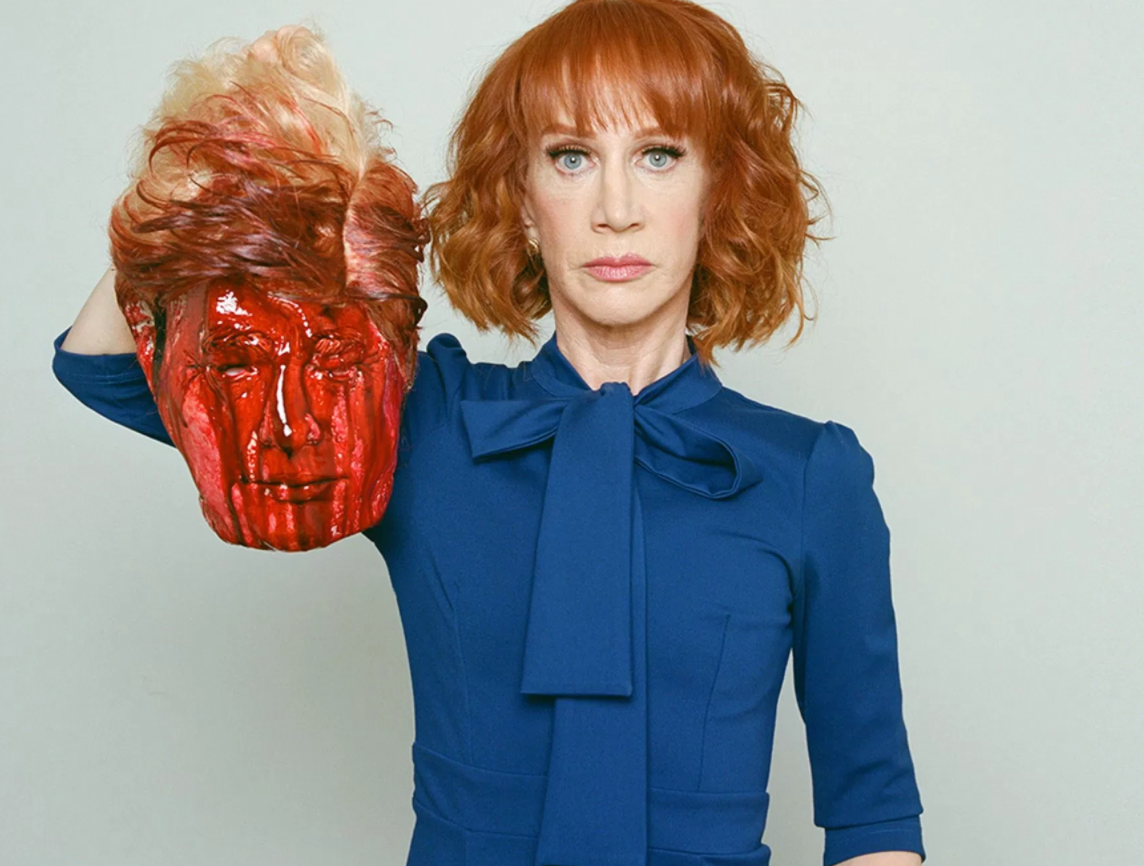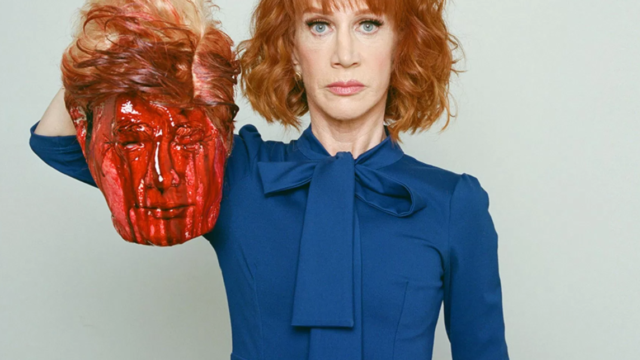By Brian Kirwin
And I can’t deny the fact that you like me. Right now, you like me! — Sally Field, Academy Awards, 1985.
Two lessons need to be understood throughout the Kathy Griffin and Donald Trump episode. One, entertainers have always been used to being protected, and they really aren’t anymore. Two, our political discourse has gotten more objectionable as the internet has made anyone into an artist, a filmmaker, a videographer or an expert commentator.
Kathy Griffin, a self-described D-list comedian and multi-millionaire, chose to have her picture taken while holding up a “beheaded” President Trump mask covered in blood. Her first defense, which was that she is a comedian and she can get away with anything because she’s “just joking,” fell flat.
There was immediate outrage from the right. Griffin expected that. Griffin wanted that. Videos of her during the photo shoot show her high-fiving the photographer and claiming that they’ll both be going to prison if they don’t leave the country immediately. She wanted the backlash. She wanted the attention. She wanted people talking about her.
She got what she wanted, but she got more than she bargained for. No, not reaction from the President. She expected that and wanted it. She wanted Trump to tweet about her. That was the whole point of doing it.
The problem, and I absolutely believe this to my core, was she never expected any backlash from the left. She expected kudos, cheers, re-tweets and adulation. She didn’t get it.
She was disavowed by Trump critics in news, media and entertainment, like Chelsea Clinton, actress Debra Messing, Keith Olbermann, Soledad O’Brien, Alissa Milano and her until-now co-host of CNN’s New Year’s Eve Anderson Cooper. And that’s hardly an exhaustive list.
That’s not what she expected.
Outrage from Trump supporters was the goal. Pats on the back from the Hollywood left were assumed. Instead, she got backlash from her liberal cohorts.
That’s when the apology happened. That’s why the apology happened.
“I’m a comic, I cross the line. I move the line, then I cross it. I went way too far. The image is too disturbing; I understand how it offends people. It wasn’t funny,” she said. What she meant was “I only wanted to offend Republicans.” When liberals backed away from her, it meant contract terminations with CNN and her commercial endorsement; it meant cancellations of concerts and bookings.
Controversy was costing her cash.
But most of all, the left didn’t like her. And that’s the goal in the entertainment world. I’ll never forget watching a video of seeing Steven Spielberg saying he hired Richard Dreyfuss because they thought the same politically. It’s why some tv shows get cancelled when the star points out “You get beat up if don’t believe what everybody believes” like Tim Allen did.
Allen said the “I’m a comedian” defense too, but it didn’t stop ABC from cancelling his show.
This motivation for liberal entertainers to be surrounded by sycophants and supporters is real, and you must understand that to understand what’s going on here. It’s why Sally Fields’ second Oscar was better because she thought Hollywood elites liked her more than they did when she won her first. There are calculations made. Attack Trump and rile up the Republicans, and get the liberals in California saying “Go, Kathy, Go.”
Kathy Griffin wanted to be Meryl Streep and wound up being Rosie O’Donnell.
When she learned of Anderson Cooper’s rebuke, reports say Griffin teared-up because she considered him a friend and felt betrayed. Griffin doesn’t mind offending people, but she surely didn’t want to offend the people she was trying to impress.
What to do? What to do?
In her effort to stop the career bleeding, she tried apologizing. That went nowhere. So, she went the other direction. Instead of saying she was a goofball comedian trying to get a laugh and went a bit too far, suddenly she became a political protest artist who was standing up for women and free expression and whatever else her lawyer told her.
She accused Trump of trying to end her career, as if CNN takes its programming orders from the White House.
Hate to break it to Kathy, but the people firing her weren’t taking orders from Trump. They rely on Americans to consume their products and if you become a detriment to that effort, you’re gone. That’s business.
But I also wondered if this would’ve ever happened without social media.
Seriously, and I’m not advocating anything here, but if someone had a photo taken with the head of a President 30 years ago, who would’ve seen it? A television network, newspaper or magazine would have to approve it and show it, and I doubt many of them actually would have.
Today, anyone can take a photo and post it. 79% of online adults have a Facebook account according to the Pew Research Center. All other platforms are below a third, with Twitter under a quarter.
Anyone can write a blog, post a photo or video, or write a political statement that can go viral instantly with no editors, no cost and no actual standards.
It’s my job to understand communications and I track them all. People used to call talk radio the “wild, wild west” because people could call in and say almost anything and it would be on the air. Rush Limbaugh, himself the occasional target of liberal boycott efforts, is carried on some 600 radio stations and at his peak had over 26 million listeners in a time slot that has never been known for radio listenership (Noon to 3).
Even talk radio had call screeners. Producers could block a caller, or bleep them and dump them if it got too far out of hand. No need to bother with that anymore. With social media, no screeners and no waiting on hold. Type and post – it’s there.
Social media is where political conversation is happening today, and calling it conversation is being charitable. You can create a meme in a minute, and there are things worse than Griffin’s sickening attempt at controversy posted every day somewhere. And, guess what? Most times no one pushes back.
Social media is made up of “friends” and “followers” – if you don’t like what you see, you can “unfriend” and “unfollow” and you won’t see it again. You can even “block” people who say and show things you don’t like.
They used to call talk radio an echo chamber, but it never hit the extreme of social media’s monolithia. People on social media attack public officials, and each other, with a fury talk radio never experienced.
I feel odd even saying this, because twenty years ago, I was one who others thought was a “bomb thrower” when it came to political discourse. Although I added some wit and charm to my style, I still found it easy to rile up any debate opponent. But I did it with an argument other than name-calling and threats.
But today’s social media, which relies mostly on self-policing, gives users a false sense of security. Be it on the right or the left, when your friends and followers all agree with you, and you never interact with people who don’t, you lose sight of what goes too far.
I think that’s what happened with Kathy Griffin. I think she got so comfortable among her friends and followers that she could put almost anything out there, and so what if it offended Trump supporters. They weren’t following her anyway.
But when she got backlash from her own crowd, she flipped out. She apologized. She cried. She lawyered up and tried to check off as many buzzword boxes of the left, her crowd, as she could. Sexism, check. Bullying, check. Artistic freedom, check. Still anti-Trump, check.
Her press conference was more to circle her friendly wagons and bring the liberal elites back to her side than it was any substantive argument. It’s working. Alec Baldwin, Jim Carrey and others are now standing by her publicly. Maybe now liberal producers and bookers can start relaxing and hiring her again, because her friends like her again.
The sad part is that Kathy Griffin really didn’t learn anything by this episode, except that as long as the door to your own echo chamber is secure, you’ll never see what’s outside.
Brian Kirwin is a government relations and political consulting specialist. He lives in Virginia Beach





